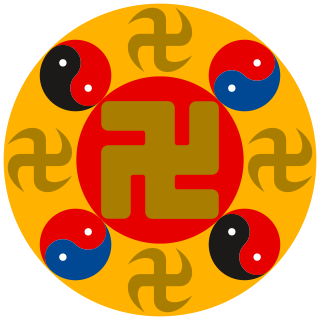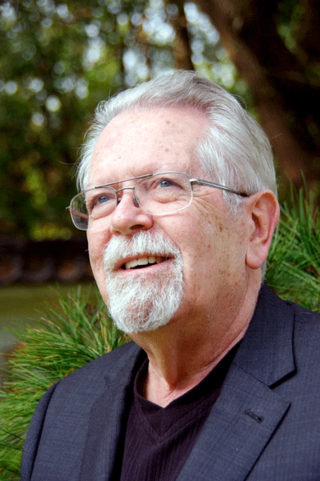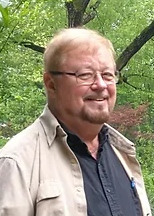
Falun Gong or Falun Dafa is a new religious movement. Falun Gong was founded by its leader Li Hongzhi in China in the early 1990s. Falun Gong has its global headquarters in Dragon Springs, a 427-acre (1.73 km2) compound in Deerpark, New York, United States, near the residence of Li Hongzhi.

Shoko Asahara, born Chizuo Matsumoto, was the founder and leader of the Japanese doomsday cult known as Aum Shinrikyo. He was convicted of masterminding the 1995 sarin gas attack on the Tokyo subway, and was also involved in several other crimes. Asahara was sentenced to death in 2004, and his final appeal failed in 2011. In June 2012, his execution was postponed due to further arrests of Aum members. He was ultimately executed along with other senior members of Aum Shinrikyo on July 6, 2018.
Millenarianism or millenarism is the belief by a religious, social, or political group or movement in a coming fundamental transformation of society, after which "all things will be changed". Millenarianism exists in various cultures and religions worldwide, with various interpretations of what constitutes a transformation.

A new religious movement (NRM), also known as alternative spirituality or a new religion, is a religious or spiritual group that has modern origins and is peripheral to its society's dominant religious culture. NRMs can be novel in origin or they can be part of a wider religion, in which case they are distinct from pre-existing denominations. Some NRMs deal with the challenges that the modernizing world poses to them by embracing individualism, while other NRMs deal with them by embracing tightly knit collective means. Scholars have estimated that NRMs number in the tens of thousands worldwide. Most NRMs only have a few members, some of them have thousands of members, and a few of them have more than a million members.

The Tokyo subway sarin attack was an act of domestic terrorism perpetrated on 20 March 1995, in Tokyo, Japan, by members of the cult movement Aum Shinrikyo. In five coordinated attacks, the perpetrators released sarin on three lines of the Tokyo Metro during rush hour, killing 13 people, severely injuring 50, and causing temporary vision problems for nearly 1,000 others. The attack was directed against trains passing through Kasumigaseki and Nagatachō, where the National Diet is headquartered in Tokyo.
Li Hongzhi is a Chinese religious leader. He is the founder and leader of Falun Gong, or Falun Dafa, a United States-based new religious movement. Li began his public teachings of Falun Gong on 13 May 1992 in Changchun, and subsequently gave lectures and taught Falun Gong exercises across China.
CESNUR, is a non-profit organization based in Turin, Italy that studies new religious movements and opposes the anti-cult movement. It was established in 1988 by Massimo Introvigne, Jean-François Mayer and Ernesto Zucchini.

John Gordon Melton is an American religious scholar who was the founding director of the Institute for the Study of American Religion and is currently the Distinguished Professor of American Religious History with the Institute for Studies of Religion at Baylor University in Waco, Texas where he resides. He is also an ordained minister in the United Methodist Church.
A cult is a group which is typically led by a charismatic and self-appointed leader, who tightly controls its members, requiring unwavering devotion to a set of beliefs and practices which are considered deviant. It is in most contexts a pejorative term, also used for a new religious movement or other social group which is defined by its unusual religious, spiritual, or philosophical beliefs and rituals, or its common interest in a particular person, object, or goal. This sense of the term is weakly defined – having divergent definitions both in popular culture and academia – and has also been an ongoing source of contention among scholars across several fields of study.
The anti-cult movement, abbreviated ACM and also known as the countercult movement, consists of various governmental and non-governmental organizations and individuals that seek to raise awareness of cults, uncover coercive practices used to attract and retain members, and help those who have become involved with harmful cult practices.
Anson D. Shupe, Jr. was an American sociologist noted for his studies of religious groups and their countermovements, family violence and clergy misconduct.
The Dialog Center International (DCI) is a Christian counter-cult organization founded in 1973 by a Danish professor of missiology and ecumenical theology, Dr. Johannes Aagaard (1928–2007).

Stephen A. Kent is a professor in the Department of Sociology at the University of Alberta in Edmonton, Alberta, Canada. He researches new religious movements (NRMs), and has published research on several such groups including the Children of God, the Church of Scientology, and other NRMs operating in Canada.
A Doomsday cult is a cult that believes in apocalypticism and millenarianism, including both those that predict disaster and those that attempt to destroy the entire universe. Sociologist John Lofland coined the term doomsday cult in his 1966 study of a group of members belonging to the Unification Church of the United States: Doomsday Cult: A Study of Conversion, Proselytization, and Maintenance of Faith. In 1958, Leon Festinger published a study of a group with cataclysmic predictions: When Prophecy Fails: A Social and Psychological Study of a Modern Group that Predicted the Destruction of the World.
The academic study of new religious movements is known as new religions studies (NRS). The study draws from the disciplines of anthropology, psychiatry, history, psychology, sociology, religious studies, and theology. Eileen Barker noted that there are five sources of information on new religious movements (NRMs): the information provided by such groups themselves, that provided by ex-members as well as the friends and relatives of members, organizations that collect information on NRMs, the mainstream media, and academics studying such phenomena.
Catherine Wessinger is an American religion scholar. She is the Rev. H. James Yamauchi, S.J. Professor of the History of Religions at Loyola University New Orleans where she teaches religious studies with a main research focus on millennialism, new religions, women and religion, and religions of India. Wessinger is co-general editor of Nova Religio: The Journal of Alternative and Emergent Religions. She served as a consultant to federal law enforcement during the Montana Freemen standoff and has been cited for her expertise concerning the Branch Davidians and other apocalyptic groups. She is the editor of the Women in Religions series at New York University Press and she is co-editor of the Women in the World's Religions and Spirituality Project, part of the World Religions and Spirituality Project.

Aleph, better known by their former name Aum Shinrikyo, is a Japanese new religious movement and doomsday cult founded by Shoko Asahara in 1987. It carried out the deadly Tokyo subway sarin attack in 1995 and was found to have been responsible for the Matsumoto sarin attack the previous year.
Heterodox teaching is a concept in the law of the People's Republic of China (PRC) and its administration regarding new religious movements and their suppression. Also translated as 'cults' or 'evil religions', "heterodox teachings" are defined in Chinese law as organizations and religious movements that either fraudulently use religion to carry out other illegal activities, deify their leaders, spread "superstition" to confuse or deceive the public, or "disturb the social order" by harming people's lives or property. What exactly these definitions mean has been interpreted in various ways since their establishment in 1999/2000. Organizations that are found by local police forces in the PRC to be distributing heterodox teachings are targeted for disruption, and its leaders and organizers are severely prosecuted.
Falun Gong and the Future of China is a 2008 book by David Ownby, published by Oxford University Press.







